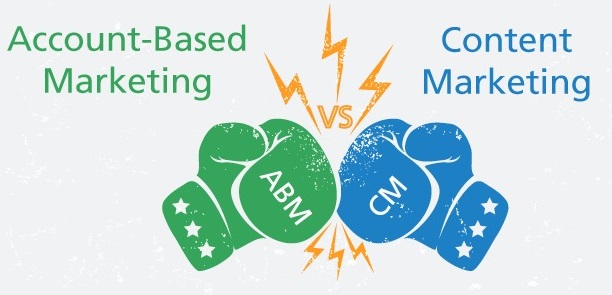
This graphic is every copywriter's big question. Which is better: account-based marketing or content marketing? If only the answer were a simple either/or.
Both content marketing and account-based marketing are strategy-driven. The big difference is the focus of the strategy. Let's look at definitions of each.
Content marketing
We turn to the professionals at Content Marketing Institute for our definition:
Content marketing is a strategic marketing approach focused on creating and distributing valuable, relevant, and consistent content to attract and retain a clearly-defined audience—and, ultimately, to drive profitable customer action.
Think of all those blog posts, white papers, infographics, guides, e-books, and more targeted to a market segment or persona.
Account Based Marketing (ABM)
Marketing and sales platform HubSpot turns to Wikipedia for its ABM definition, which we repeat here:
ABM is a strategic approach to business marketing based on account awareness in which an organization considers and communicates with individual prospects or customer accounts as markets of one.
That definition feels convoluted, so let's unpack it. In marketing to B2B companies, the majority of buying decisions have at least 5 people who chime in. In some companies, that number can go up to 20 or more. Each person has an agenda and probably needs your product or service for different reasons.
ABM is about marketing your product or service directly to the decision-makers at a single company. For example, let's say you've identified your ideal target as Company A. Company A has 10-12 people involved in decisions regarding tech purchases.
ABM aligns sales and marketing into a single strategy to nurture the whole "account" rather than the "lead," which is usually a single decision maker in a variety of companies.
Differences between the two
ABM casts a very narrow net in a target company, so if you miss your mark, you've nothing to show for it. Content marketing has a wide net that eventually captures leads.
Today, content has saturated the internet. It's harder to stand out with content marketing, but great content still gets attention. On the flip side, your content with ABM is hyper targeted and personalized, which means no more generic content.
Content marketing still offers you a high reward for low effort. It also creates your credibility in an industry. ABM, on the other hand, only works when sales and marketing are strongly aligned on consistent and targeted messaging. ABM also produces better quality leads.
So which one is better?
It's not a matter of one or the other because they complement each other. Content marketing is a great inbound marketing strategy that's proven to work. And ABM is an amazing outbound marketing strategy that generates fantastic results.
The key is to use them together. Content marketing pulls in prospects interested in your information. ABM helps you target specific individuals at companies that are your ideal customers.
Accomplishing your ultimate goal—winning and retaining customers—requires both content marketing to draw them in and ABM to target accounts specifically.
What are your thoughts?
Let us know in the comments below if you're using only one strategy or both ABM and content marketing. What challenges are you facing with creating content in the face of these dual strategies?


